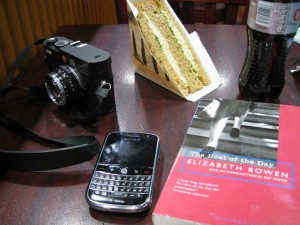The Wall Street Journal recently published an interesting piece on the coffee+WiFi culture.
Amid the economic downturn, there are fewer places in New York to plug in computers. As idle workers fill coffee-shop tables — nursing a single cup, if that, and surfing the Web for hours — and as shop owners struggle to stay in business, a decade-old love affair between coffee shops and laptop-wielding customers is fading. In some places, customers just get cold looks, but in a growing number of small coffee shops, firm restrictions on laptop use have been imposed and electric outlets have been locked. The laptop backlash may predate the recession, but the recession clearly has accelerated it.
Given that free WiFi has been more of a US than a British tradition, the change bites harder over there. (In fact in the UK the only restaurant chain that consistently offers free WiFi is — amazingly — McDonalds, which is why I can sometimes be found under the golden arches with one of their — surprisingly good — black coffees while I connect to down- or up-load something urgent.)
The WSJ piece sparked a thoughful post by Joey Devilla entitled “The Tragedy of the Coffee Shop” in which he puts the coffee-shop phenomenon in a wider context. He points out that the coffee-house has played a venerable role in the evolution of democracy in many European countries.
Then, as now, they functioned as what sociologists like to call “Third Places”: places that are neither home (the “First Place”) nor work (the “Second Place”), but a place that functions a community gathering place where broader, and often more creative social interactions happen. Cafes, community centres, churches, pubs in the U.K., town squares, open-air basketball courts, the parking lots of 7-11s and hackerspaces like Toronto’s HacklabTO are all third places.
In the last decade, the WiFi-enabled coffee shop has played a small but honourable role in the evolution of computer code. The guys who wrote Delicious Library in 2006, for example, did most if not all of their software development in a Seattle cafe — but did so with the permisson of the owner.

